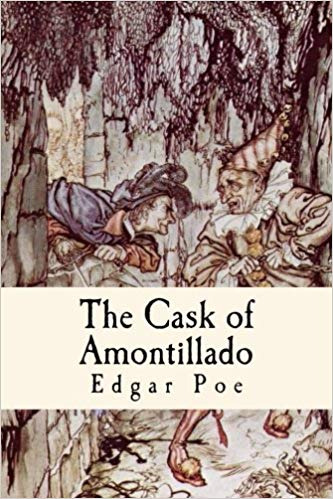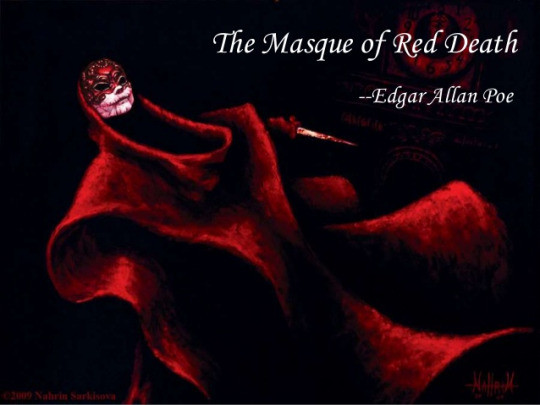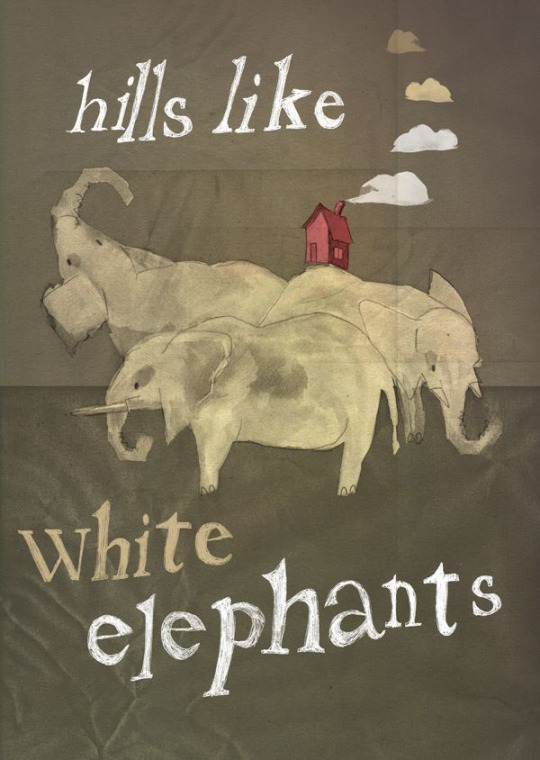Don't wanna be here? Send us removal request.
Text
6 Stories
The Cask of Amontillado

The Cask of Amontillado showcased different lessons or morals that we can use in our everyday lives. However, its association with the golden rule is what we should really pick among all of its offered dilemmas or morals. The Cask of Amontillado is a short story written by Edgar Allan Poe in 1846. He used a very unique approach since he conveys the story from the murderer's perspective, which can be considered as a taboo for some individuals
Despite the spooky and thrilling effect of the story, it also provides a detailed narrative of its setting. Making a reader visualize the scenario better. Thus, after reading a very satisfying story, one of the greatest lessons that I’ve perfectly remember is: We should always be sensitive about how we treat or approach others.
Cruelty and rudeness should never be accepted especially if it was used to disrespect or to insult others Regardless if we meant no harm towards others. To do unto others as you would have them do unto you is not just being virtuous and divine but it is being prudent, for it is our duty and responsibility to give no harm to other people. And to balance my opinion, we should also remember that we should not hold any grudge towards others since we are all perfectly imperfect. We are all capable of committing different level and kinds of sins. For we should know to forgive and how to move on. Hence, vengeance will never be considered as an equal act for justice.
God Sees the Truth, But Waits.

“Throughout life people will make you mad, disrespect you and treat you bad. Let God deal with the things they do, cause hate in your heart will consume you too.” -Will Smith
Forgiveness and acceptance; these words can simply describe the morals shown in the story, “God Sees the Truth, But Waits.” it is a Russian short story written by Leo Tolstoy in 1872. The story revolves around Aksionov’s life after being imprisoned due to a false accusation of murder. Despite witnessing and experiencing life without mercy and happiness in Siberia, Aksionov learned the whole process of acceptance and forgiveness using his faith as a center of his everyday life.
As stated above, we as individuals should learn how to forgive others, No matter how hard it may be. We should let our faith conquer our hearts to help us to become a better person, despite our hatred and pain from the past and our anxiousness for our future. Hence, Tolstoy helps us realize that no matter how painful our sufferings are, no matter how times people tried to do you wrong, we should always seek acceptance and forgiveness. For us to heal and for us to move forward.
The Masque of Red Death

The Masque of Red Death is a short story written by Edgar Allan Poe in 1842. The flow of the story follows Prince Prospero's attempts to avoid a dangerous plague, known as the Red Death, by hiding along with many other wealthy nobles. They host a masquerade ball within seven rooms each decorated with a different color. Amid their revelry, a mysterious figure disguised as a Red Death victim enters and makes his way through each of the rooms. Prospero dies after confronting this stranger, whose "costume" proves to contain nothing tangible inside it; the guests also died. “There's nowhere you can be that isn't where you're meant to be...” this quote from John Lennon can be used to explain the moral lesson of the story. Death, whether we like it or not will always be the bottom line of our fate. We cannot change our fate. Thus, we cannot escape death. Regardless of your social status or how smart you are, death can never be denied just like how Prince Prospero had his own party and locks his guests and himself in his home to avoid contracting the Red Death. But still after trying their best everyone or anything should always come to an end.
The Piece of String

The Piece of String was written by Guy de Maupassant in 1883. It is included in the short story collection "Miss Harriet”.the story revolves In Goderville, where there lived Maitre Hauchecome and his enemy Maitre Malandain. One day, Maitre Hauchecome saw a piece of string in the road and thought that he could make use of it in the future, and so bent to pick it up. He noticed, however, his enemy Maitre Malandain was watching, and he knew that he would be embarrassed if Maitre Malandain saw him picking up an itsy bitsy string, so Maitre Hauchecome acted as if he were searching for something. That day, news came out that someone lost his wallet. Quickly, Maitre Malandain accused Maitre Hauchecome of stealing the wallet, and the town believed him, but Maitre Hauchecome did not steal the wallet. The town of Goderville did not believe Maitre Hauchecome was innocent, even though someone found the wallet in the street and returned it. Maitre Hauchecome died of a broken heart, despairing of being thought a liar.
The story showed how important credibility and reputation for someone. And how easy for others to stain and manipulate our views towards others. Hence, A way of building a good reputation is by telling the truth. Telling the truth will reward you in times of need wherein you can gain the trust of others. furthermore. The story shows how cruel our judgment can be so we need to sensitive in speaking or in approaching a certain scenario that involves others.
Hills Like White Elephants

Hills Like White Elephants is a short story written by Ernest Hemingway in 1927. It was published in the literary magazine transition. The story focuses on a conversation between an American man and a young woman, described as a "girl," at a Spanish train station while waiting for a train to Madrid. The girl compares the nearby hills to white elephants. The pair indirectly discuss an "operation" that the man wants the girl to have, which is implied to be an abortion.
Killing a child is one of the topics raised in this story. We may have different opinions about this. However, we should always remember that we should not do several things that we don’t want others to do to us. Lastly, Those who kill others because of their greed, meet the same fate for their cruel deed.
The Handsomest Drowned Man in the World

The Handsomest Drowned Man in the World”= is written by Gabriel García Márquez in 1968. It tells the tale of a corpse found on the shore of a small fishing village. Esteban, is unusually tall and so shockingly handsome that the villager begins to fall in love with him, treating him with religious beliefs. Eventually, they dump the body into the sea but leave it unweighted in the hope that Esteban will float back someday. They vow to transform the village into the kind of place worthy of Esteban.
Indeed, our physical appearance can simply pronounce our impact to different personalities or individuals. It may be temporary. however, it is also an art that we should respect and appreciate. This story showed how we can inspire someone just by giving our best in terms of our appearance. Just like how we can communicate using our facial expressions and how we can convey messages through body language. But we should also remember that we still need to have a good character regardless of your age, sex or appearance for the character is only thing that fully describes who you are and what you’re going to be in the future.
1 note
·
View note
Text
BLOG# 3: Oedipus Rex

Oedipus the King, is an Athenian tragedy by Sophocles. Oedipus is the son of Laius and Jocasta, the king and queen of Thebes. A murder cast a doom over Laius and all of his descendants. When his son is born, the king consults an oracle to his horror, the oracle reveals that he will be perished by his own son. Laius and Jocasta orders a servant to slay the infant for them.
As the infant grows to manhood, Oedipus heard his future through an oracle. The oracle told him that he is destined to mate with his own mother by killing his biological father. Desperate to avoid this terrible fate, Oedipus continues his journey but still ended up fulfilling the prophecy by killing Laius.
Parents love can be tainted especially when greed and fear combine. However, fate plays a large part in Oedipus’s existence by having him as the punishment of his own father. Furthermore, it was also shown that there are punishments and rewards in our own actions and decisions in life. We can never get away with our karma that’s why we should always do good ting regardless of its reward.
0 notes
Text
Blog#2: Rostam and Sohrab, Troy and The Odyssey

The story of Rostam and Sohrab is a part of the 10th-century Persian epic Shahnameh by the Persian poet Ferdowsi. It tells the tragic story of the heroes Rostam and his long lost son, Sohrab. The poem shows pure and innocent love from a lost son who always wanted to meet his father. However, Fate doesn’t play fair; after all the challenges faced by Sohrab his first acquaintance with his father was meant to be bloody and dangerous.and as Rustam failed to consider his existence was bounded by pain and regrets after killing his own son.
This story can be reflected in our own families and society. There are times when we failed to consider others arguments or existence because of greed and power, we tend to set aside our families and loved ones for the sake of our own dignity and pride. And with that, we shall be prepared to face its consequences including eternal pain.
Furthermore, the death of a child or loved ones was also shown as the greatest weapon that can be used to attack every soldier’s weak points. It causes endless pain and agony. It also breaks everyone’s heart in just a snap. Hence, killing your own blood must be the greatest punishment for an old and arrogant soldier.
TROY:

Troy is a 2004 epic historical war drama film. It was based on Homer's Iliad in its narration of the entire story of the decade-long Trojan War. Thus, the war began after the elopement of Queen Helen of Sparta and Prince Paris of Troy. Helen’s agitated husband Menelaus convinced his brother Agamemnon, king of Mycenae, to lead an expedition to retrieve her in exchange for having Troy under his leadership.
Hence, Both countries/cities are powerful and equipped with different skilled soldiers. The Greek Alliance was more powerful in terms of skilled manpower. Despite having the lower hand in the war the Greeks was able to pull through because of their well-trained royalties and soldiers. Meanwhile, Troy’s royalties were not good enough in terms of hand to hand combat (except for Hector). Furthermore, the Greek alliance was more brutal and barbaric compared to the elegance of troy.
The story revolves around the feelings of every character. Their pain and desperation in saving their land and their women caused the continuous shedding of blood from the warriors with the same vision in joining the war. Greed and love were also shown as the greatest weapon for every warrior whos willing to sacrifice their life in exchange for their love ones.
ODYSSEY:

The Odyssey is one of two major ancient Greek epic poems written by Homer. The poem focuses on the Greek hero Odysseus, king of Ithaca, and his journey home after the fall of Troy. It takes Odysseus ten years to reach Ithaca after the ten-year Trojan War In his absence, it is assumed Odysseus has died, and his wife Penelope and son Telemachus must deal with a group of unruly suitors, the Ministers, who compete for Penelope's hand in marriage.
Loyalty was indeed one of the hidden gems that you can spot inside the story of the Odyssey. Odysseus’s wounds and bruises from his journey can never be compared to the longing inside his heart. His wife Penelope was used as a symbology for eternal love and suffering. However, it was also shown that women were treated unequally compared to men. They were used and treated as a part of a man’s burden and property. These perspectives were shown repeatedly from the move itself.
Also, bravery and wit were one of the most showcased characteristics of Odysseus in this movie. Hence, his personality caught the viewer’s attention several times, despite his mishaps and misfortune he was able to succeed in meeting his wife and his child.
0 notes
Text
BLOG #1: The Epic of Gilgamesh and The Rubaiyat

“Immortality is to live your life doing good things, and leaving your mark behind.” this quotation from Brandon Lee summarizes the whole journey of Gilgamesh in finding immortality. The epic of Gilgamesh provides various lessons in the form of storytelling. The epic was considered as ancient Mesopotamian mythology. Moreover, it is an epic poem written in Akkadian during the late second millennium BC. it shows how a God’s grief can cause wonders in our worlds. Brotherhood was also one of the greatest components of the story.
His pain, loneliness, and grief are the key to his success in leaving a mark behind his heroic acts. Hence, as he continues his journey for the search of immortality he was able to find a precious gem that could never be taken away from him.and it is concealed by his bravery, kindness and friendship inside his chest that could last forever. Being a king does not guarantee his immortality, instead, it allowed him to be better and to be remembered by many. Despite his cruel mask and arrogance, his bravery and love for his kingdom will always be the first thing that will touch everyone’s heart. As well as the friendship he built that will probably be marked in every reader’s mind and memory as they reminisce the epic or the life story of Gilgamesh
Gilgamesh’s character can also be observed in present times. Others tend to be too stiff and proud when it comes to their respective careers in life resulting in arrogance and harm. However, we should always remember that the only thing that could last forever is our legacy which will be passed through generations and the only legacy that could be considered universal to all ages is kindness. Pure heart and passion will always be the key to immortality for it will leave a mark of love instead of a scar from a painful past.

“The unexamined life is not worth living” Socrates shows that life should be examined and explored to be happy. Your mere existence does not summarize your whole life. You should know how to live with a passion for being alive and free. And just like Socrates, Omar Khayyam also showed us how we should enjoy and live our lives through his poem:” The Rubaiyat.
The Rubaiyat is a Persian poem that explains the journey of every individual from birth up to its death. It was presented by a series of quatrains. the whole collection can be interpreted using Sufism and other figures of speech. Hence, it states that everyone will encounter the same fate. Regardless of their personal and social status, they must experience life by exploring its depth. By living through happiness and devastation. For after all those lessons, we shall experience death.
Furthermore, Omar Khayyam also said that we should live our life to the fullest for we shall meet the end with a smile of fulfillment while knowing that we have served our purpose. Moreover, the poem may also be interpreted in focus to love as its main subject since life and love are alike in terms of bringing flavors such as sweet and bitterness. It should or it may also experience regardless of their personal and social status. However, some love doesn’t make it eternally making the feelings to suffer and the love to fade.
To sum it up, The Rubaiyat and The Epic of Gilgamesh thought us the we could turn pain into something bigger such as heroism and we can live life to the fullest while welcoming or meeting the end with all smiles for we have served our purpose which is to love and to be loved, to be kind and to be remembered despite our flaws.
3 notes
·
View notes